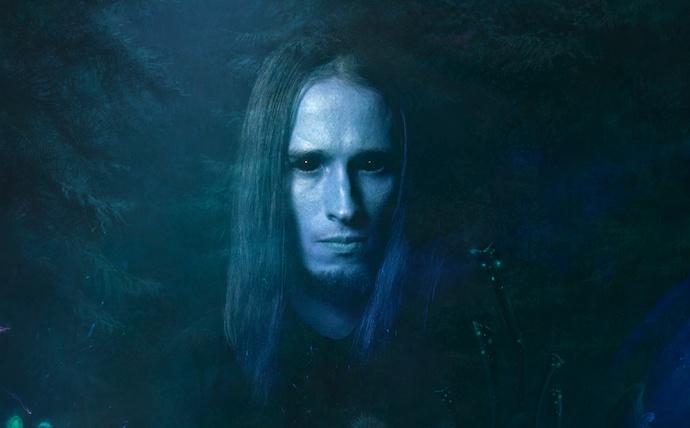
(Comrade Aleks has again brought us a very interesting conversation with a very engaging personality, and this time it’s George Gabrielyan, the man behind the black metal band Gloosh from Siberian Russia, whose new album is being released today.)
Gloosh means “thick forest” or “backwoods” in Russian, a fitting title for a black metal band from Siberia, isn’t it? It’s a one-man band / studio project started by George Gabrielyan just two years ago, and there are already one EP and two full-length albums in the Gloosh discography. This black metal has a strong “atmospheric” aspect and the lyrics are written and performed into Russian, though you can find the translations in Metal-Archives or Bandcamp, ‘cause George cares for the band’s followers.
Well, actually the second album named Sylvan Coven is just being released today, and it’s a good reason to interview George. But besides that news, George has much more to tell, as he does play nowadays in two more black metal bands – Eoront and Frozenwoods — so he seems to be the right person to know about a few more subjects, and not only about his own path to the blackened underground but also about the Siberian scene in general.
******
Hi Georgy! How are you? How do you feel now, with the new Gloosh album complete and released?
Greetings! Yeah I relaxed for a while, but sitting in one place is a bad idea. Music has recently become almost on a par with the main work, and therefore, in order to have a decent result, I need to make further efforts and not fade away in own activities. After all, in addition to Gloosh I also have several other projects.
You started Gloosh after already being a part of the bands Eoront and Frozenwoods, both performing black metal as well. What motivated you to start another band which follows a similar direction?
Perhaps this is a wish to regain some independence, in my own sacred corner. It’s good to work as a team, or even as a pair, but as a composer sometimes I feel cramped within one collective. And in such individual genres as black metal, I want to reveal music exactly as I see and hear it myself. Indeed, in the band all initial ideas pass through a team-common prism, exfoliating the author’s dust. Also by that time I had accumulated a lot of unused material, which I didnt want to realize in Eoront or in Frozenwoods for various reasons. If you listen to all three of these projects, you will hear a definite difference in the very muscles of this music.
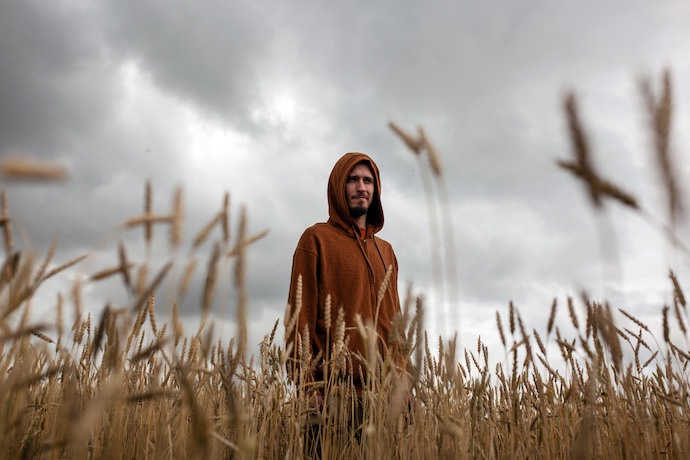
Did you see Gloosh as a studio project from the start? Were you that sure in your own skills or did you just not have another choice back then?
The initiation of Gloosh was actually an experiment. I wanted to check if I could do everything on my own this year, without involving outside people, sound engineers and other guys. Just like it was once in 2012 and 2013 when I independently recorded two first works for Eoront. I wanted to write some tracks in an extremely primitive form (only blastbeats with a couple of chords, and a raw sound), but as we can see, I ended up with something different.
How did it happen that you changed your mind? Was it the technical or conceptual side of “extremely primitive” black metal that left you unsatisfied with the initial plan?
It happened by itself. One chord led to more, one riff spawned the next. I guess I just don’t know how to write that raw evil primitive black metal we’re talking about, or I can’t by my inner nature. And the point is not that raw primitive black metal is something bad, let everyone here judge for themselves. The fact is that “no matter how hard I try to make a salad from only cucumbers, I always get a Greek salad”.
Gloosh – Hexenring
With Gloosh’s debut album Timewheel (2020) you started to explore different aspects of nature through black metal. Why did you see this genre as the most suitable for expressing these kinds of themes?
I just love this genre, it is so close to me as much as possible so that I can express my ideas through it. I am not an innovator, I do not come up with any pretentious musical solutions, and someone may say that I just copy other bands, heh. Well, maybe maybe, but I will just say that it is pleasant for me to compose music in the same shapes that I love from other artists. I even identified for myself the five names that influenced my genre the most: Drudkh, WITTR, Forteresse, Aeternus and Blut Aus Nord. It seems to me that these guys in their own genre perfectly convey (or conveyed in the early years of their activity) these very aspects of nature.
A lot of early black metal bands pay their tribute to Nature in a more uncompromised and straightforward manner. Does this form work for you still? How far do you feel Gloosh stands from the old good “true & evil” path? Did you ever care?
You know, when I make music, it’s during the process itself that the last thing I worry about is how evil my music is. I have always said that music is good that is made with pure emotions, that is honest. And honesty is primarily about how honest the author is with himself. I repeat that I am not saying that I am doing everything right from the point of view of some genre and ideological canons, but at least I do it honestly, I am not lying to myself, I am not lying to anyone who might want to listen to my music. That’s all.
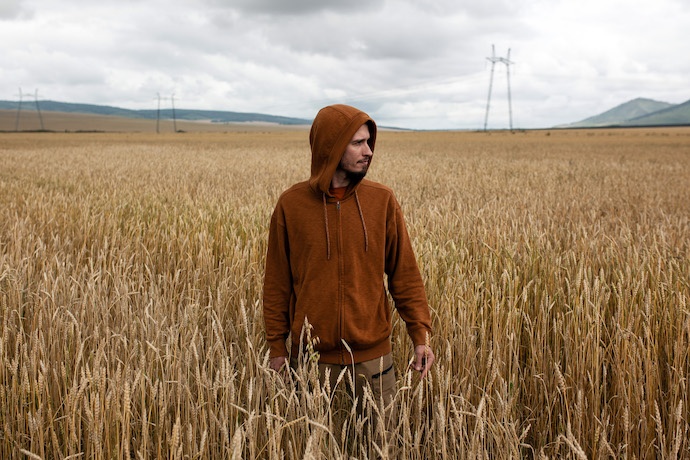
You’ve mentioned Forteresse amongst a few of most influential bands for you, and this band is known for its radical positions. And actually, provocation and radicalism went / go hand-in-hand with (“true”) black metal; nowadays new black metal bands appear and some seem to be far from all of these extreme matters. How do you see this evolution from your point of view?
I have a lot of respect for those who try to show not their pompous and destructive malice through black metal, but their respect for their own culture and heritage. I find a lot of positive and creative energy in some radicalism of the Quebecans, despite the many messages in their music. It seems to me that they are not trying to destroy something, they are trying to preserve what they have. The same applies to the Ukrainian scene, the Japanese, and even the Prehispanic scene. I know that many musicians from different countries, under the attractive masks of cultural and national traditionalism, are trying to hide their destructivism, but I still try to believe that there are those among these warriors who are more important in preserving their heritage than standing for the destruction of someone else.
It seems you found a label for Timewheel pretty fast, and the same year The River EP saw the light of day. It sounds like a direct continuation of the debut album; were those four tracks left over from the Timewheel session or did you work on them as a separate work?
You know, I wasn’t looking for a label. Really, I have not been doing such searches lately. I had a not very successful experience with a label within the framework of my project Eoront, and when I started Gloosh, I was sure that this project should definitely remain in my personal pocket, at least in the part of rights and ownings. The vinyl publishers of my albums found me themselves, offered comfortable conditions for publishing – these are the great guys from Casus Belli Musica and Depths Of Void. Now we are cooperating and making friends.
As for The River EP, I was composing music at a different time from Timewheel, six months after the recording of Timewheel. But it seems logical to me that the ideas sound like the next chapter of one book. If in the future I manage to keep this thread that connects all my works, I will only be glad.
Gloosh – The River
How did you work over the songs which went into Gloosh new album Sylvan Coven? Did you set some goals before starting this recording session in order to reach another sound or atmosphere in comparison with previous releases?
Probably, it would be correct to answer this question – “yes, I set myself certain goals, and I worked according to a certain plan.” But still it is not so. Of course, there are some goals, but in the creative process you seem to catch a wave on a surfing board and then just follow its impulse, its stream. Something comes, something leaves, something does not go according to the plan that you outlined. At one point you stop just noticing something, but then suddenly the work is almost over.
As Timewheel and The River are both conceptual records on their own, what kind of theme unites all the new songs in one Sylvan Coven album?
Imagine that you are a traveler, you enter a deep forest, and then magic happens to you. The magic may not be beautiful, but horrible. You can be misled by silvans, you can be stupefied by witches and fairies, you can be swallowed by swamps, you can be frightened to death by all those creatures hiding between woods. It all goes like a rope through the whole album. This is a coven, which you accidentally went to, and now there is no way back, either you will succumb and take this magic into yourself, or it will take you away by itself. It seems to me that similar folklore exists in any forest on our planet; these stories are told in different languages and are depicted by different cultures. I just tried to depict audiovisually how this worldwide phenomenon of the insidious magic forest looks through the eyes of my soul.
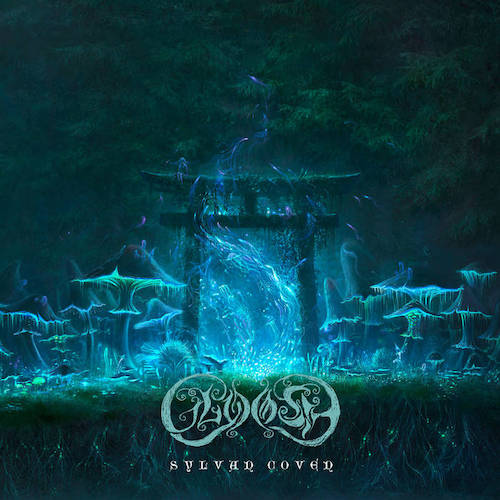
How much space do you leave for the chtonic, “evil” side of the forest / nature, as Ajattara or some other bands do? Do you see it as a being with its own spirit?
Yes, I have some animistic, pantheistic outlook on nature. I believe this is something that we have not yet known. This is what we must fear, respect and honor, no matter how much masters of the world we ourselves seem. I know that nature will definitely devour us one day, and we can only try to preserve this primitive fear in ourselves, so that our days are still a little longer than they can be. Ultimately, the fear for what nature hides has saved us to this minute.
What would you point to as your own personal achievement in Sylvan Coven?
I think there is no direct one achievement. Hmm, no, well actually of course there is, I have learned a lot in technical terms thanks to this work. But similar achievements appear with every recorded album. Each new work is a new challenge, this is a new step, and this is a new level.
Gloosh – Vjkhr
It seems that Krasnoyarsk represents most authentic black metal stuff nowadays — there are few names which are well-known in Russia and abroad. How do you see this phenomenon from the inside? Is it a matter of local climate or surrounding?
Maybe that is pure coincidence. There are many other cities and regions that are very favorable for this kind of creative expression. It just so happens that we (Krasnoyarsk) have some talents. But let’s be real – other regions also have quite a few such names. Therefore, I do not single out Krasnoyarsk as a separate entity and also do not try to be a local musician, to tie my own albums to the very local geographic scene.
Can you name these local talents? And may you name other Russian black metal bands which may interest those who don’t know much about the Russian scene?
First of all, of course, I will mention the guys from Grima and Ultar as Krasnoyarsk guys. They really did a lot for themselves and for our Krasnoyarsk scene. If we talk about Russia, I will prick the Ural guys from Elderwind and Vspolokh (Всполох). Of course, these are also the projects of Andrey Novozhilov – Olhava and Trna – and, in general, the whole St. Petersburg team in the post-black metal sphere. This is a powerful layer of projects by Sadist and the Stavrapol Necrodivision. There are amazing avant-garde artists from VTTA, Zatemno (Затемно) and Cage Of Creation. And others – others, I am afraid to list everyone here, because I can undeservedly forget someone, and our readers will radically disagree with some names. So we’d better finish here.
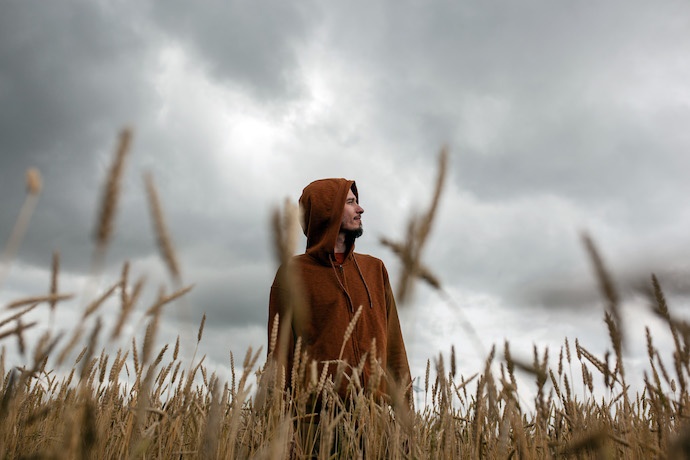
Can you tell there’s a black metal scene in your region? Do bands support each other or do you have your own BM elite or BM hermits?
No, I would not say that we have some kind of particular Siberian scene. We have bands that are moving almost all over the world, commercially self-motivated. And we have insider-bands that prefer to hang out within their own circles, and these circles are by no means always musical. And it seems to me that neither one nor the other needs this “particular black metal scene”.
Thanks for the interview Georgy! God speed on you and your projects! Would you like to offer a few more words for our readers?
Thank you very much for the very interesting and non-standard questions!
And I will say to the readers the same I have always said before – honor and fear nature, respect your cultures and the cultures of other people, be honest with everyone and with yourself, and let the Sun and the Moon always shine around your auras.
https://www.facebook.com/atmogloosh

Very cool to read. Thanks for doing the interview.
On the first picture he looks like Michael Wincott in movie The Crow.:)